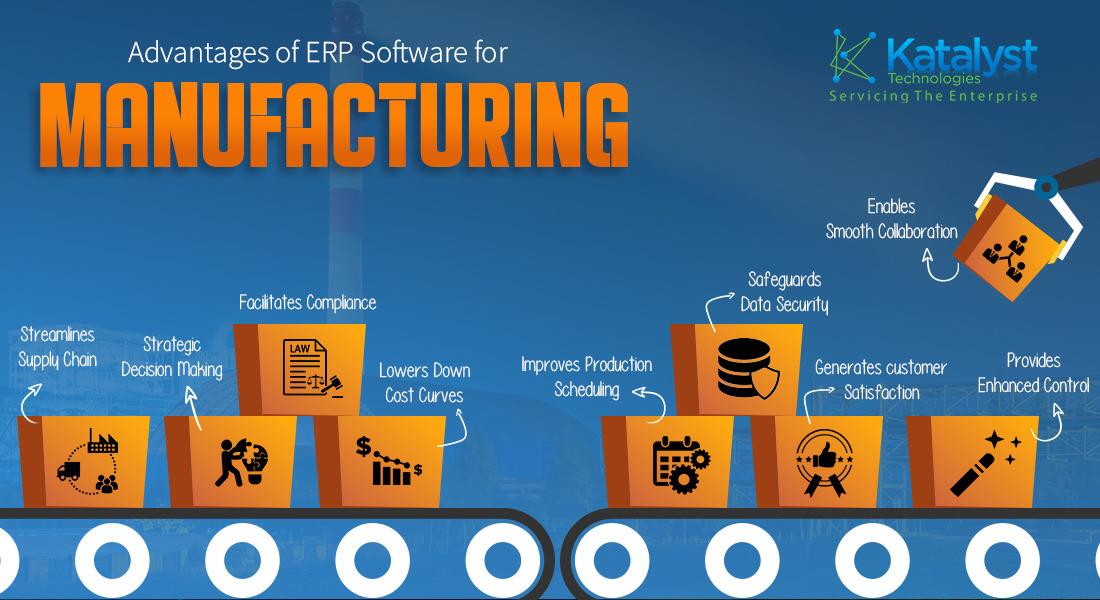The manufacturing industry is the backbone of the economy. However, the new technology trends have forced firms to revisit their business structure to incorporate more agility, responsiveness, operational efficiency, and transparency to make informed decisions. It has become imperative for the manufacturers to rely on sophisticated technologies to cater to the enlightened and green customers of the contemporary market.
According to Market Research Future, Global ERP software market is expected to reach USD 49.03 billion by 2023, at a compound annual growth rate (CAGR) of 7.45%. The figures indicate the scope of numerous redeemable opportunities available in the coming time.
In recent years, numerous enterprises have assimilated Enterprise Resource Planning ERP software into their business processes to accomplish strategic goals while maintaining a competitive edge. However, many are still in the decision making a phase to ascertain the implication of Enterprise Resource Planning software on the growth curve of their business.
Are you one of them who are facing the same dilemma?
The post intends to simplify your decision-making process while taking your business on the right trajectory.
Here is the list of potential benefits that firms can accrue by ERP software implementation.
In addition to that, lets us understand first the concept of Enterprise Resource Planning in manufacturing.
What is ERP Manufacturing Software?
ERP software is an integrated suite of customizable software applications and modules that are directed to improve and align the components of the manufacturing process using real-time data inputs. Enterprise Resource Planning facilitates a smooth flow of information through all the subdomains, thus channelizing an optimal resource allocation leading to streamlining workflows across the manufacturing process.
To put simply, it catalyzes the collaboration and connection between value-producing partners through meaningful information and predicting future trends by tracking and analyzing the current interactions at the same time.
How can ERP implementation drive your business?
The business intelligence software has the potency of rendering a competitive advantage in the following ways.
Streamlines Supply Chain: The ERP software system automates the global supply chain points making them adaptable and resilient. The impact is visible on lead times, delivery schedules, demand forecasting, procurement, and more. The software drives automation and opens the room for business innovations.
Supports strategic decision making: ERP solutions enable data centralization with full visibility, helping in faster, insightful, and smart decisions across all departments and functions. The cascading of relevant information at all levels help top management to invest in the right strategies.
Lowers down cost curves: Enterprise Resource Planning software mechanizes the business processes that reduce manual efforts and redundant expenses. A manufacturing process becomes efficient when driven by real-time information. Moreover, the errors are significantly reduced with improved quality and precision.
Improves Production scheduling: ERP software ensures that resources are optimally allocated and utilized. It helps in managing the purchase, payments, inventory management, replenishment, machine operations, and staff scheduling for a competent production process.
Generates customer satisfaction: The intelligent business software creates perfect alignment between different business processes, which results in the value enhancement for customers. The software also empowers customers to interact with the company through informative portals where they get the information like product availability and new launching products. Enterprise Resource Planning strengthens customer satisfaction through speedy delivery mechanisms and automation to handle queries.
Provides enhanced control: As complexity increases, control mechanisms should be robust enough to keep the productivity on track. Enterprise Resource Planning derives real-time information and accurate data for decision making, thus rendering better control. Moreover, automation reduces the probability of deviations and miscalculations.
Ensures visible reporting: Reporting becomes more accessible and transparent with an ERP solution. As Enterprise Resource Planning relies on centralization of timely and precise information, various reports and analytics can be generated for different functional areas. The hassles are significantly reduced as reports are available at one click.
Safeguards data security: ERP solutions are data-driven, and thus, data security is the utmost concern. With a high level of safety mechanisms and extensive controls, data is managed with accuracy, consistency, and top care. The sensitive information is accessible to accountability centers only whereas a centralized backup is also maintained to meet any contingency.
Enables smooth collaboration: After ERP implementation, collaboration among multiple silos looks like a piece of cake. With all the data funneled in one place, communication is faster within the company. Additionally, real-time facts help in project collaborations.
Facilitates compliance: The ERP software is a holistic system that runs intending to attain perfect alignment with standard procedures. And thus, the reports generated and data maintained in the database serves audit purpose. The business intelligence software also incorporates legal regulations to ensure smooth adherence to the laws.
Ready to invest in ERP?
ERP is an advanced tool capable of taking the business to the next level by instilling swiftness in the system. The impact of Enterprise Resource Planning on productivity and long term growth gives an excellent indication of ERP implementation.
If you are thinking in the same direction, but unable to assess the needs of your organization, seek help from experts.












No Comments